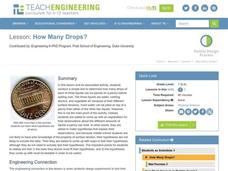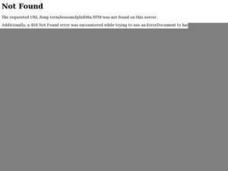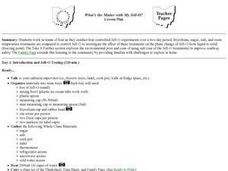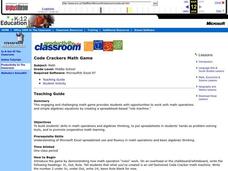Curated OER
How Many Drops?
Seventh graders hypothesize about the number of drops of liquid that can be placed on a penny before it spills over. They examine both the concept of devising a hypothesis and the idea of surface tension. They determine the difference...
Curated OER
Mutations--Preexisting or Acquired?
Learners state the controls and variables of the Newcombe spread experiment. They state a hypothesis for the Newcombe spread experiment. Students distinguish between the characteristics of a preexisting mutations and those of an...
Curated OER
Silicate Gardens
Students take digital pictures of their Silicate Gardens as an analysis of measurements of silicate tube growth. In this silicate measurements lesson plan, students download pictures of Silicate Gardens being grown on the International...
Curated OER
What Do Plants Need to Grow?
Fourth graders control variables to determine the effect on plant growth. They collect information by observing and measuring and construct simple graphs, tables, maps and charts to organize, examine and evaluate information.
Curated OER
Temperature Changes in the Atmosphere
Students analyze how different variables affect atmospheric temperature. They construct a model of an ecosystem, select a variable, design and conduct an experiment, and record and analyze the data to present to the class.
Curated OER
Our Food and Microorganisms
Students answer questions about how microorganisms can affect our food supply and how they can be controlled. The first set of inquiry activities are directed by the teacher. Subsequent activities are based on students generating their...
Curated OER
Germinating Seeds on Gelatin
Students germinate seeds in unflavored gelatin to which liquid house plant food has been added. Students observe and record plant growth in this medium with a variety of variables in a number of experiments.
Curated OER
An Investigation into Effects of Rhizobium Soil Bacteria on Nitrogen Availability
Students identify the control and the variables in the experiment. They describe the growth of plants with and without nitrogen fixing bacteria, then name the bacterium responsible for making nitrogen available to the plant.
Curated OER
Succession and Experimental Process
Students describe the roles of controlled, manipulated and responding variables in scientific research. They also identify biotic and abiotic interactions affecting the makeup of a plant community.
Curated OER
What's the Matter with My Jell-o?
Young scholars work in teams of four as they conduct four controlled Jell-O experiments over a two-day period. The Family Page extends this learning to the community by providing families with challenges to explore at home.
Curated OER
Using Graphs to Compare
Students use the FoilSim computer simulation program, and demonstrate an understanding of the lift variables by explaining their graphical representations. They demonstrate an understanding of forces and motion.
Curated OER
Mountain Building
Fourth graders identify variables that influence rates of change. They, through group consensus and using the assigned materials, design and build what they believe to be the strongest mountain possible.
Curated OER
Investigating the Biosphere with Planetary Models
Students model the biosphere and manipulate variables affecting change and plan their experiments with the help of others. They describe their question, hypothesis, and methods of investigation.
Curated OER
Lotic Environment
Students assemble a classroom river model as an example of a lotic system. They control and measure biotic and abiotic information for the in-class system and compare data with a lotic system in a natural environment.
Curated OER
Night Creatures of the Kalahari
Learners conduct an experiment to demonstrate how fruit fly populations are controlled by spiders. They observe a variety of environments with fruit flies and spiders and consider how vital spiders are to controlling the insect population.
Curated OER
Fertilizer Frenzy
Pupils design and conduct an experiment testing the effect of fertilizers/soaps on algal growth. They estimate and predict, identify the variables, formulate a hypothesis, and record and analyze the data, presenting their findings in a...
Curated OER
Code Crackers
Students work in teams creating and posing math rules and trying to guess them using a formula controlled worksheet they create with Excel. Student pairs take turns to see who can crack the other's code the fastest.
Curated OER
Examining Infiltration Rates of Various Soil Types
Students formulate their own hypothesis, determine which variables are important to test their hypothesis, design an experiment in which they collect data. They utilize instruments and tools to measure, calculate, and organize data.
Curated OER
Never Push Your Pendulum
Students investigate the behavior of pendulums and identify the variables that affect it. For this pendulum lesson students complete a lab on pendulums, make conclusions about frequency and the period then conduct a controlled experiment.
Curated OER
Solar
Learners study solar energy. For this renewable energy lesson students complete several lab activities using different controls and variables.
Curated OER
Lab Experiments in Nutrition
Looking for authentic hands-on nutritional experiments? High schoolers will perform experiments to test for the presence of vitamin C in several solutions as well as the effect of caffeine on Daphnia. They will also consider the...
Curated OER
Designing Experiments - Overview
Students explore the concepts that enable them to design and conduct sound scientific experiments. They critique a faulty experiment and become familiar with some of the criteria of a good experiment. They conduct their own experiment.
Curated OER
Steps of the Scientific Method
Steps of the scientific method are summarized, and then an example experiment is presented to allow practice identifying the steps. The graphics and animations are a little blurry, but this otherwise well-formulated presentation will...
Curated OER
Glenbrook South High School Science Scoring Rubric: Student Laboratory Reports
Here is an unexpected, but practical resource. It is not a learning exercise, but rather an outline of what a science laboratory participant should include in a report. Especially valuable is a grading rubric that spells out what is...

























